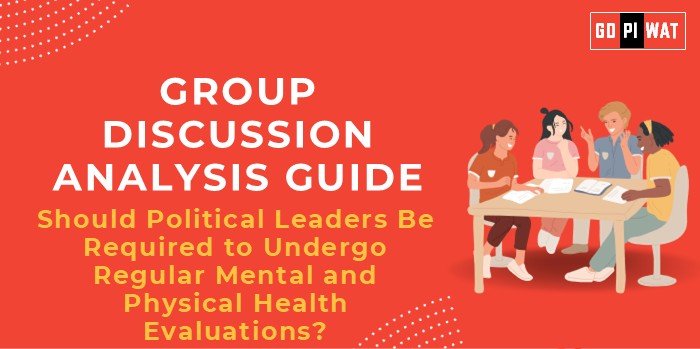📋 Group Discussion (GD) Analysis Guide
🌐 Should Political Leaders Be Required to Undergo Regular Mental and Physical Health Evaluations?
The topic delves into the importance of leaders’ fitness in making critical decisions that affect millions of lives. It explores the balance between public accountability and personal privacy amidst high-pressure political environments and aging leadership populations.
📊 Quick Facts and Key Statistics
- Average Age of Political Leaders: Over 50% of global heads of state are aged 60 or older.
- Mental Health Challenges: 20% of adults globally experience mental health issues annually (WHO, 2024).
- Leadership Stress Index: Political leaders face stress levels 30% higher than the general population (Harvard Medical School).
- Health Disclosure Laws: Countries like the U.S. mandate partial health disclosures during presidential elections.
🔑 Stakeholders and Their Roles
- Governments: Enforce health evaluation policies and ensure transparency.
- Citizens: Advocate for leader accountability due to societal impact.
- Healthcare Systems: Provide unbiased evaluations while adhering to ethical standards.
- Media: Balance investigative reporting with respect for privacy.
🏆 Achievements and Challenges
- Achievements:
- Transparency laws enhance public trust in some democracies.
- Health awareness campaigns set positive examples for society.
- Global standards like WHO’s wellness initiatives advocate for leader health.
- Challenges:
- Privacy vs. Transparency: Striking a fair balance remains contentious.
- Political Exploitation: Health data risks being weaponized.
- Implementation Gaps: Policies and practices vary across nations.
🌍 Global Comparisons
- United States: Presidents undergo annual medical exams with partial public reports.
- Germany: No formal health disclosure requirements for political leaders.
📖 Case Studies
- U.S. Presidential Elections: Candidate health records became a focal issue in the 2016 and 2020 campaigns.
🛠️ Structured Arguments for Discussion
- Supporting Stance: “Regular health evaluations ensure leaders are fit to make critical decisions.”
- Opposing Stance: “Mandatory health evaluations infringe on privacy and risk politicization.”
- Balanced Perspective: “Regular evaluations are vital but must respect privacy and remain non-partisan.”
✨ Effective Discussion Approaches
- Opening Approaches:
- Highlight public trust surveys showing concerns about leader health.
- Use international comparisons to frame the debate.
- Counter-Argument Handling:
- Privacy concerns: Advocate limited disclosure of non-critical findings.
- Politicization risks: Suggest third-party independent evaluation committees.
📈 Strategic Analysis of Strengths and Weaknesses
- Strengths: Enhances accountability and improves public trust.
- Weaknesses: Risks of politicization and legal privacy challenges.
- Opportunities: Global leadership standards for accountability.
- Threats: Misuse of health data and resistance from political leaders.
📚 Connecting with B-School Applications
- Real-World Applications: Crafting policies for leadership health in governance and ethical studies.
- Sample Interview Questions:
- “How can health evaluations improve governance?”
- “What are ethical considerations in mandatory health checks?”
- Insights for Students:
- Explore leadership stress management strategies.
- Delve into ethical dilemmas in leadership accountability.


